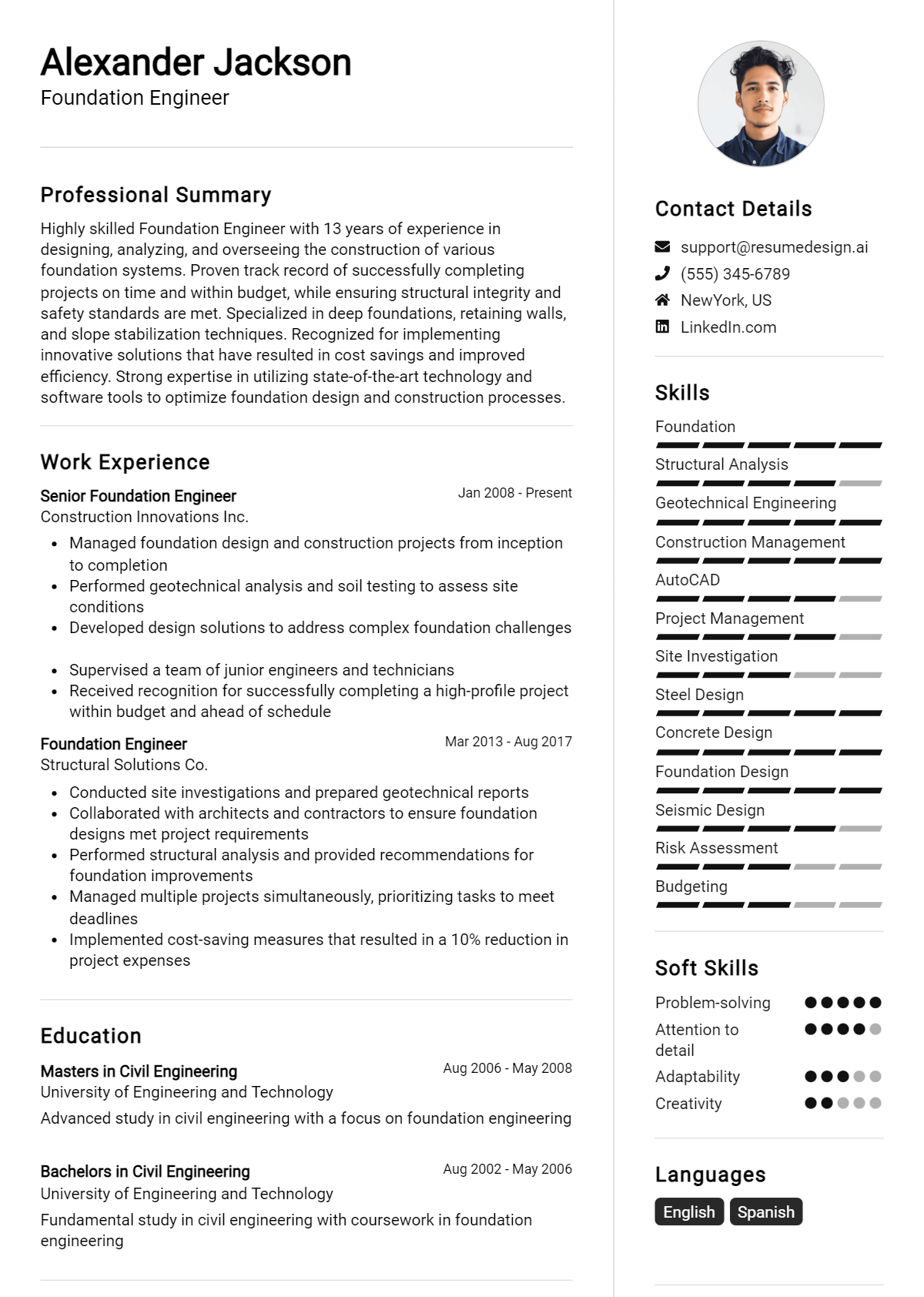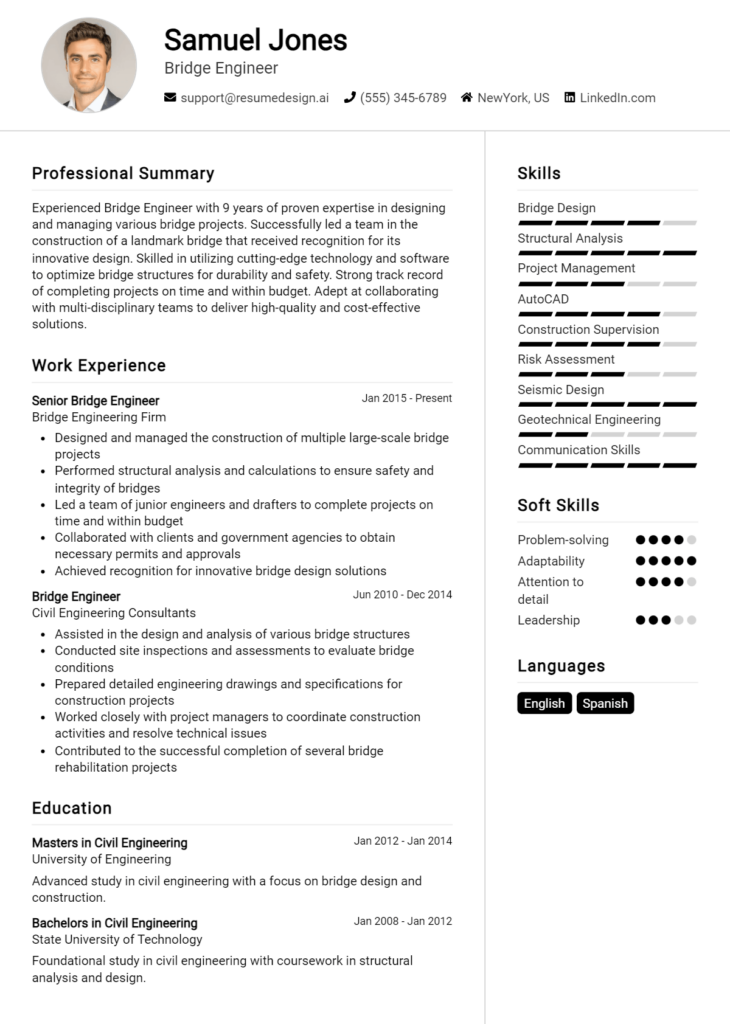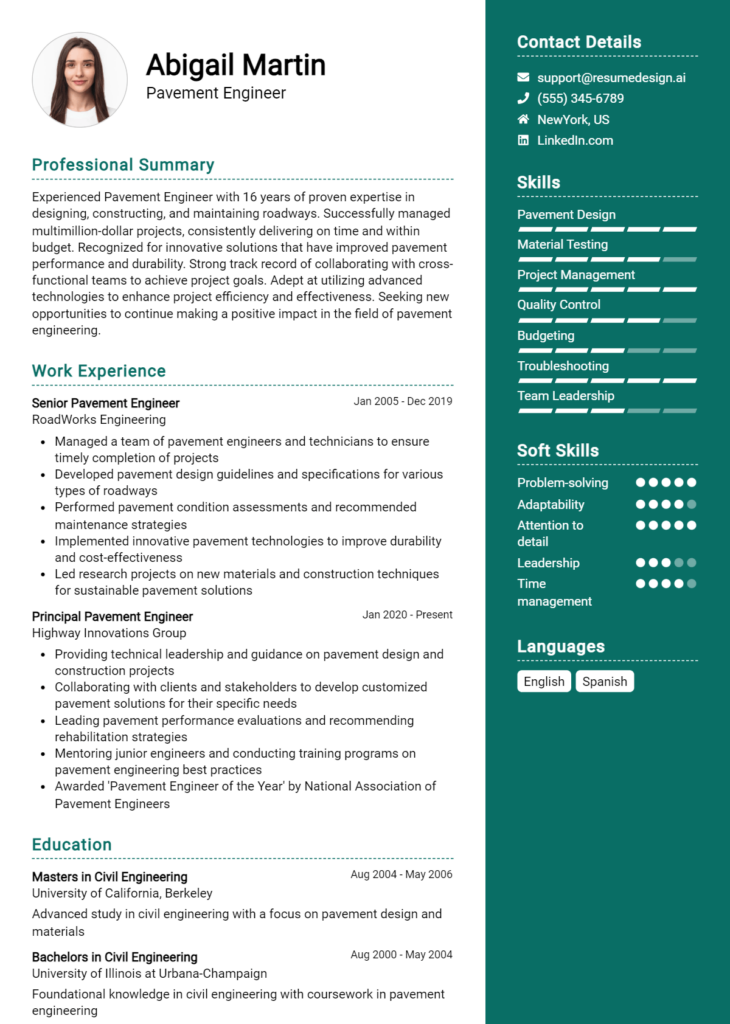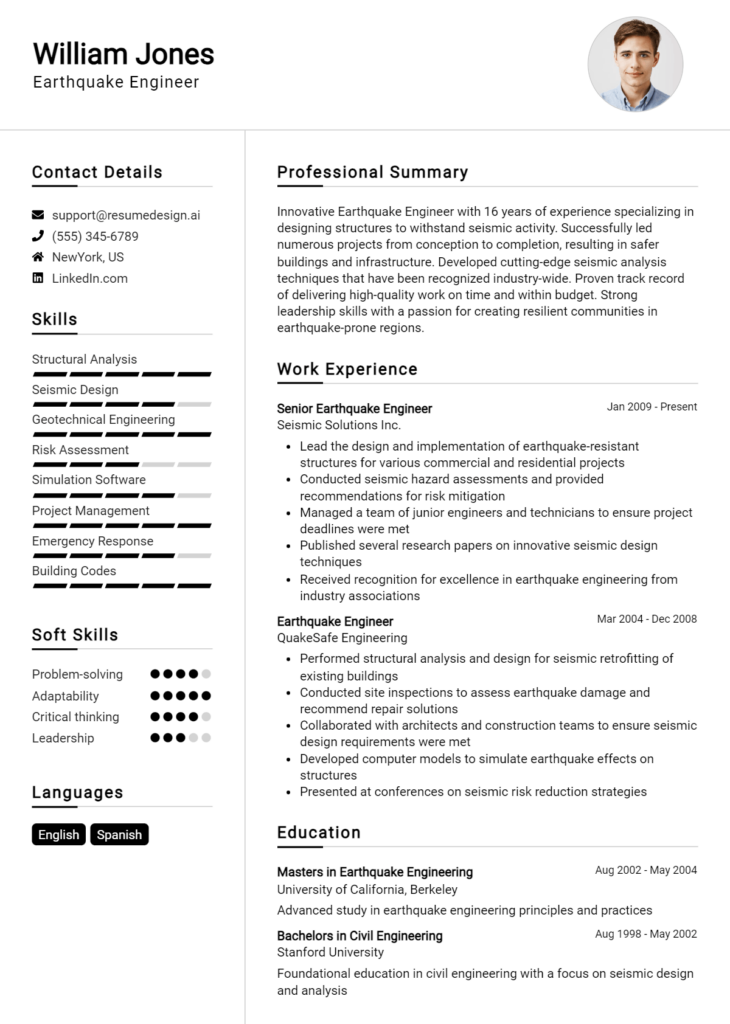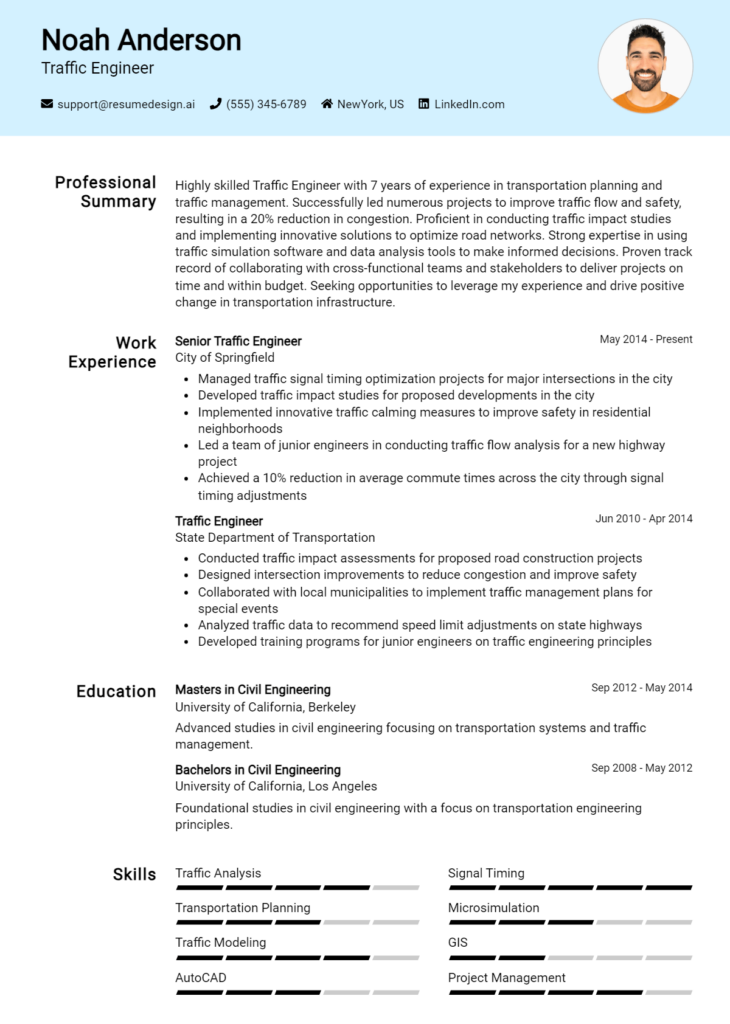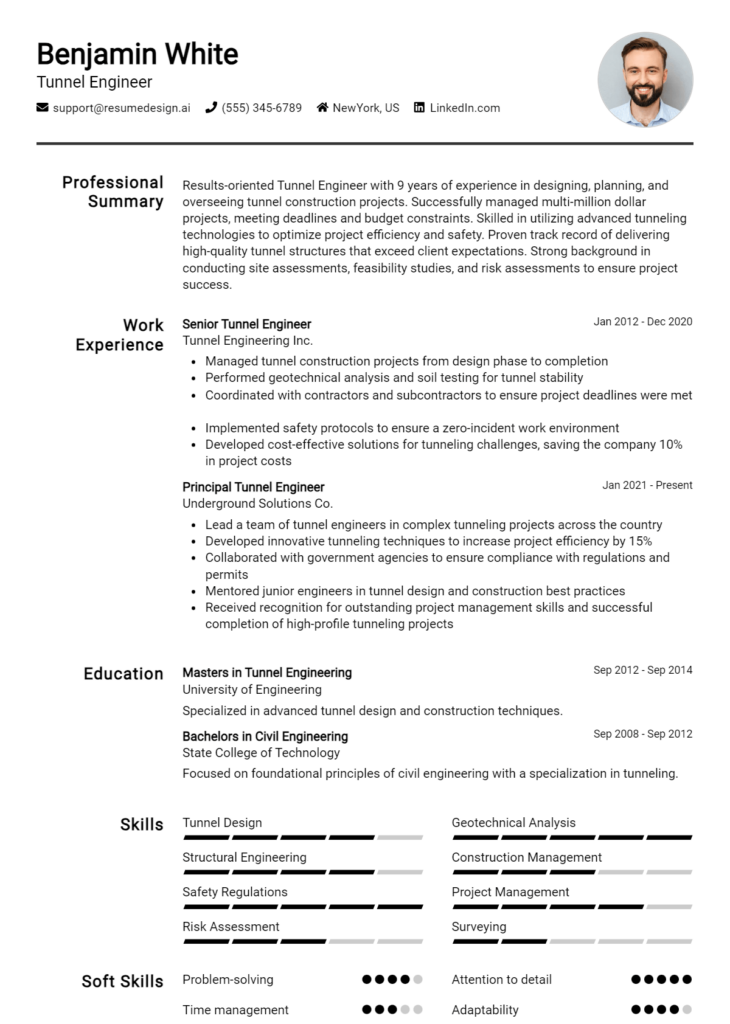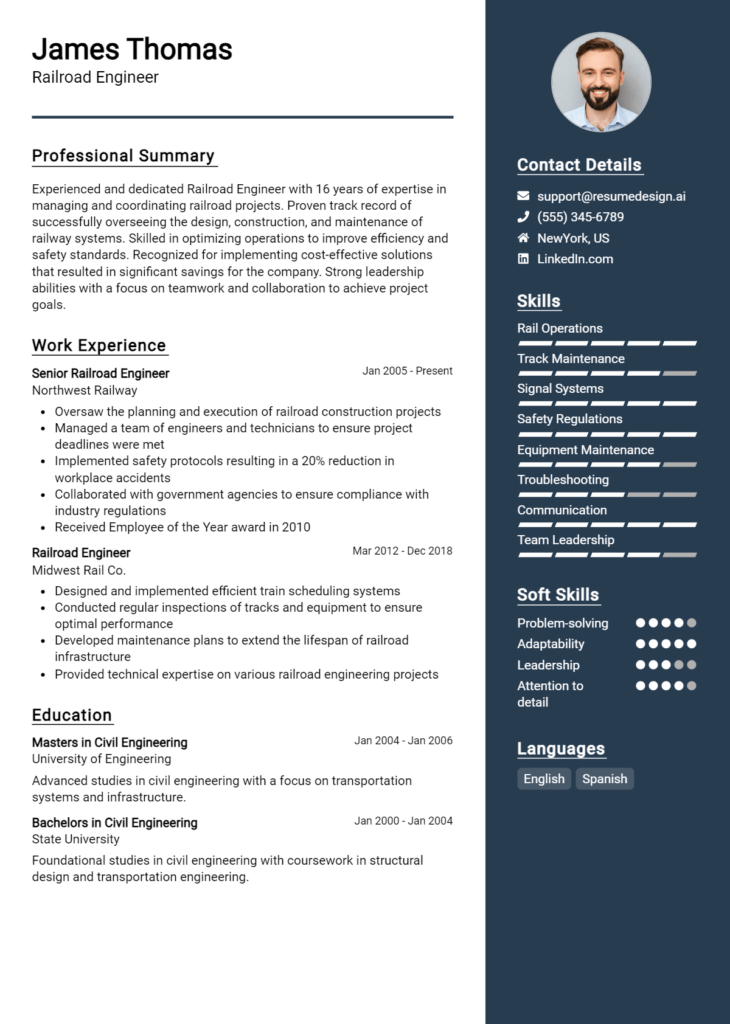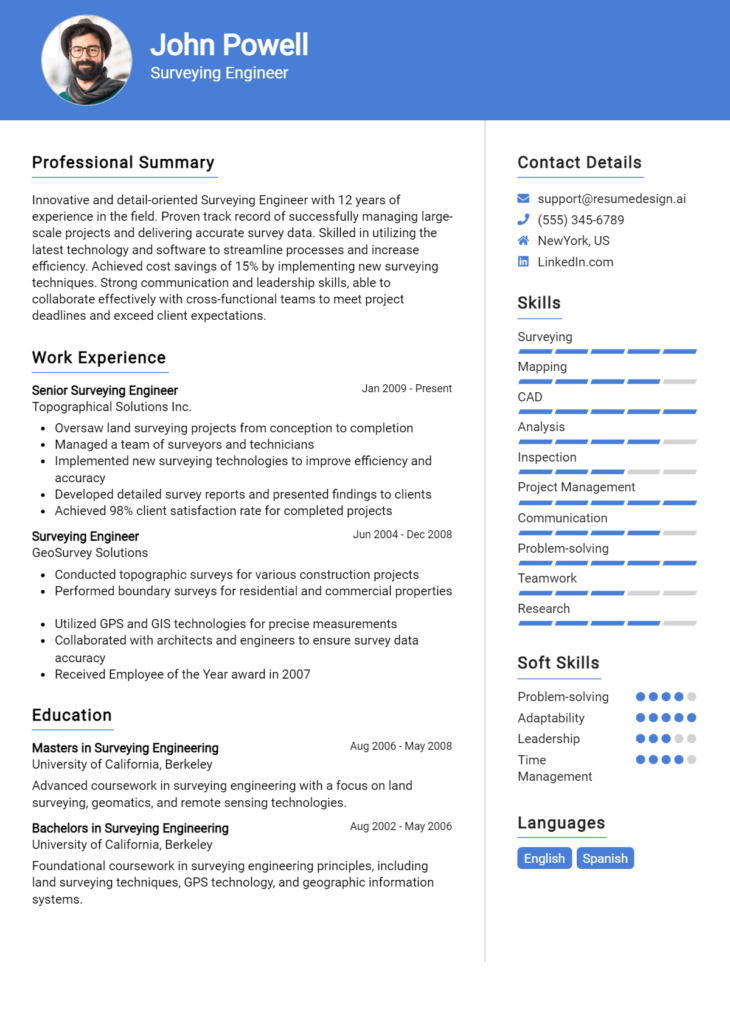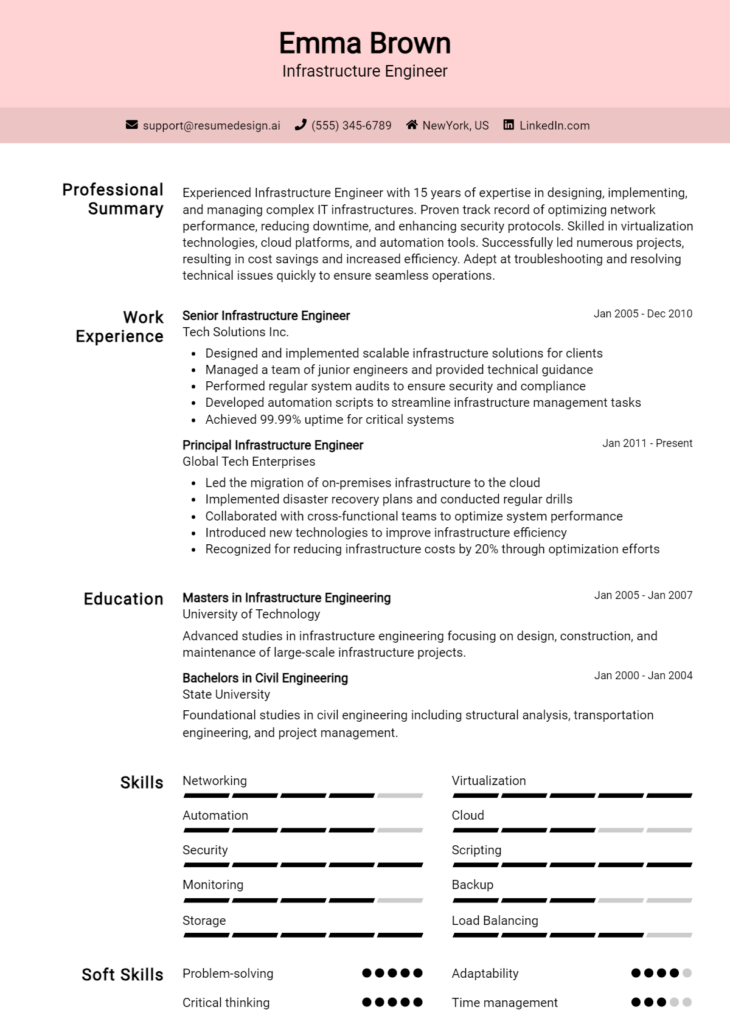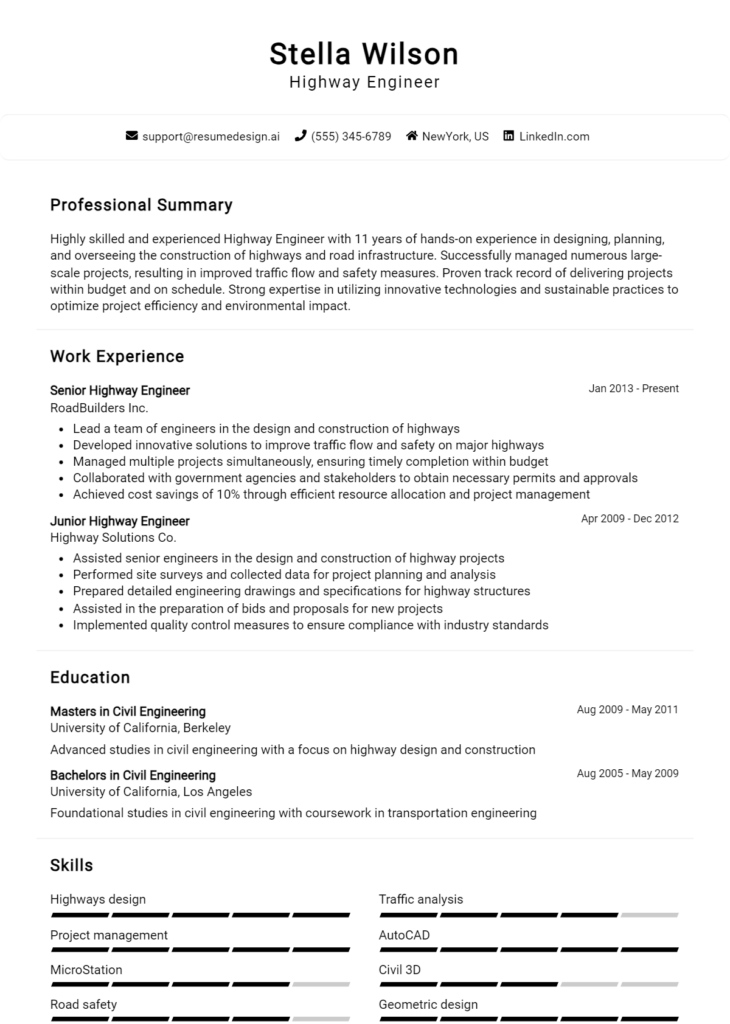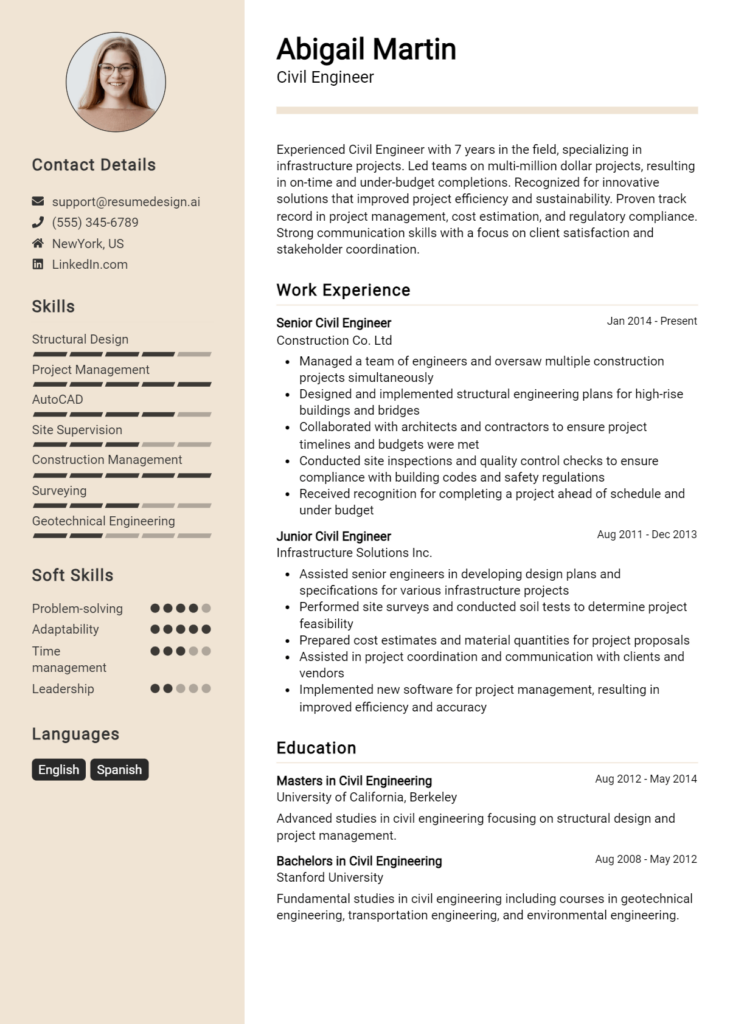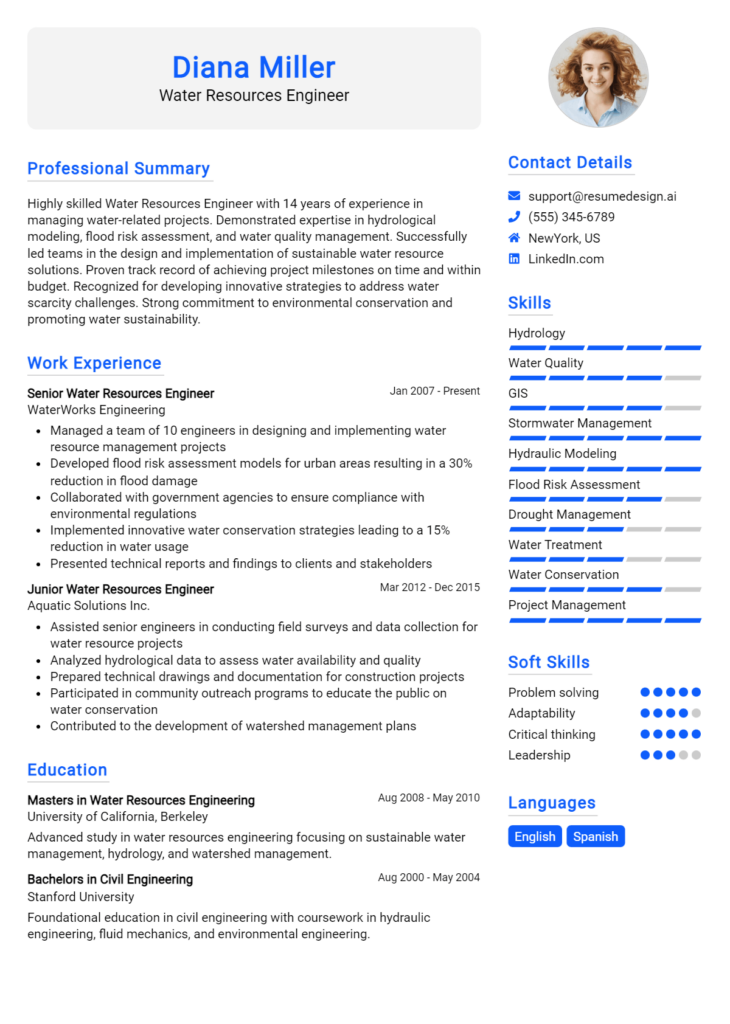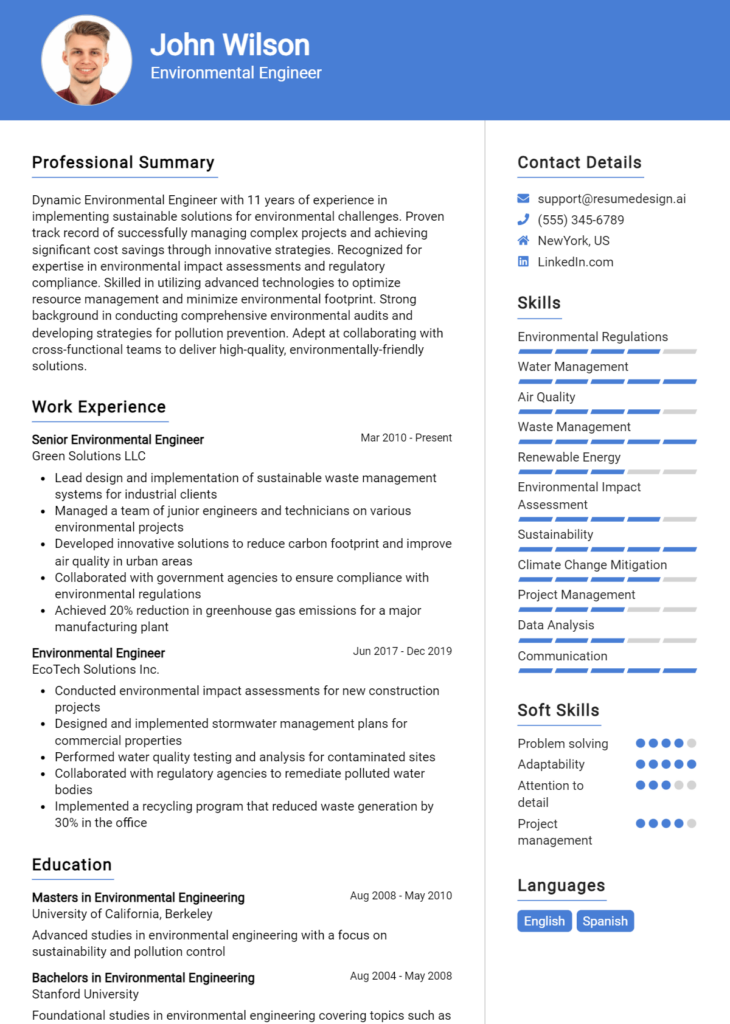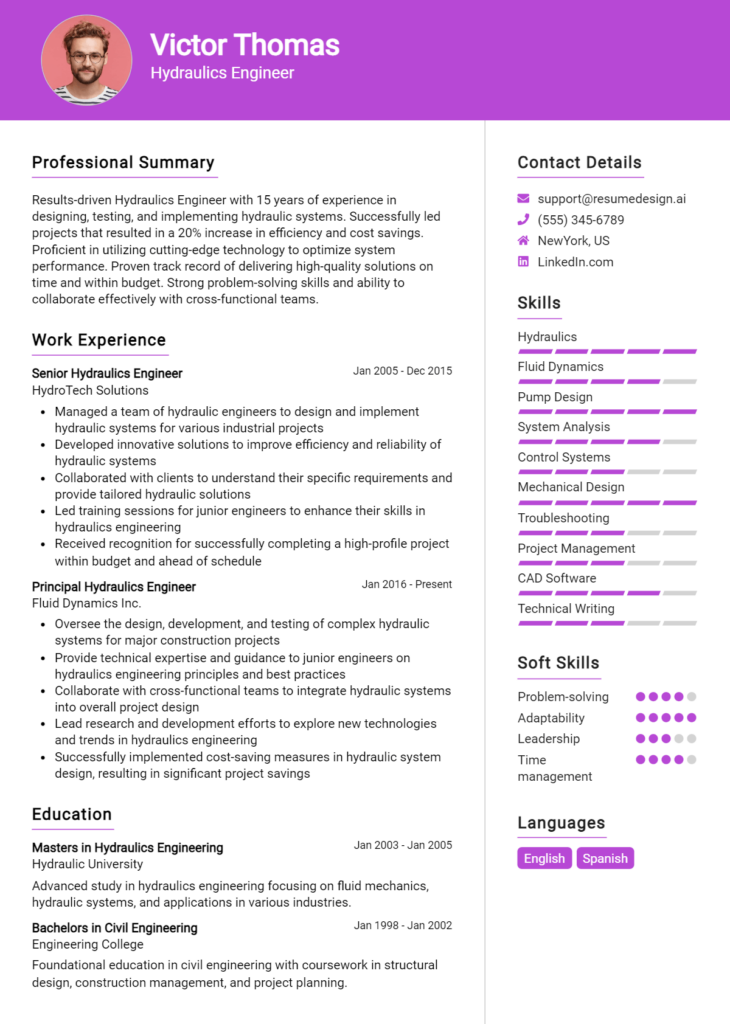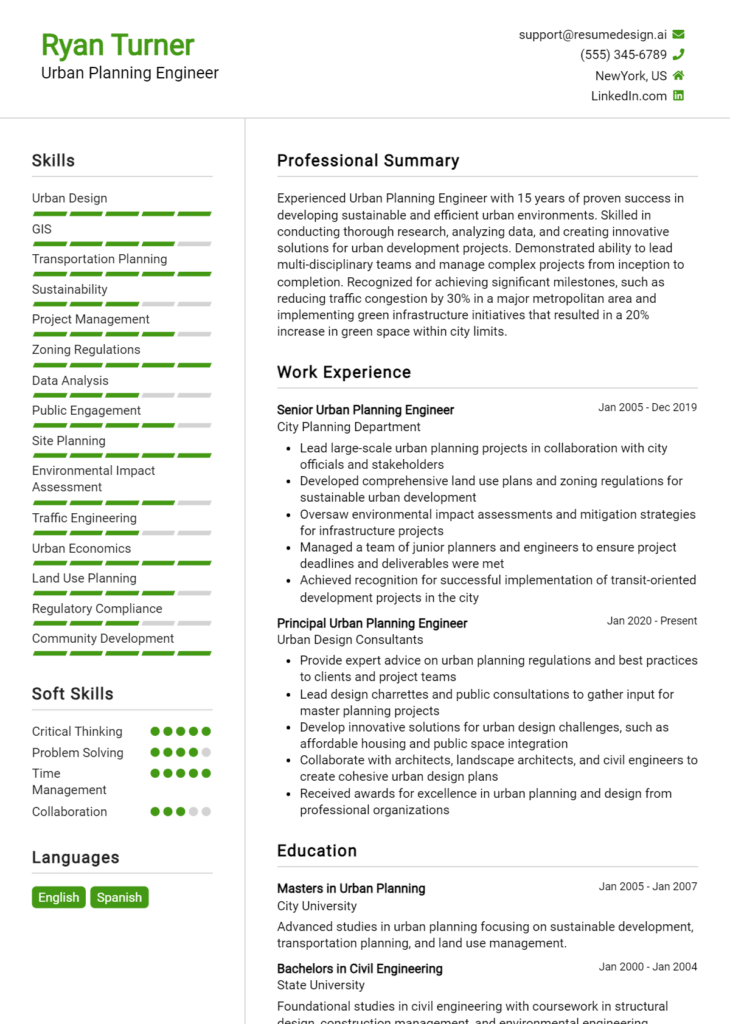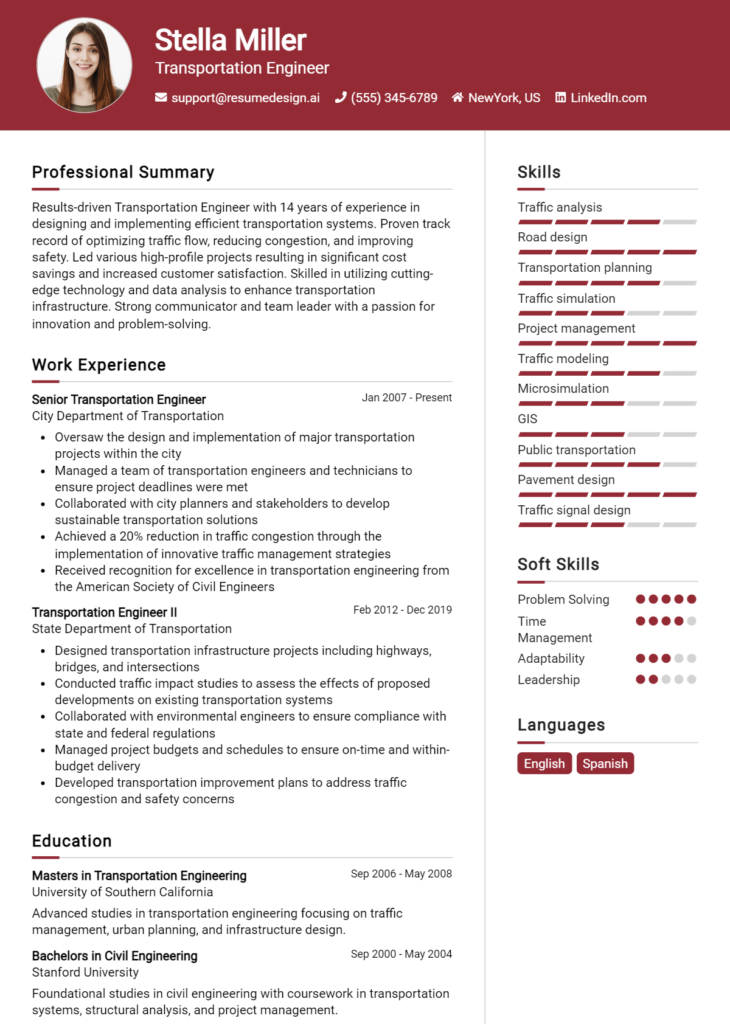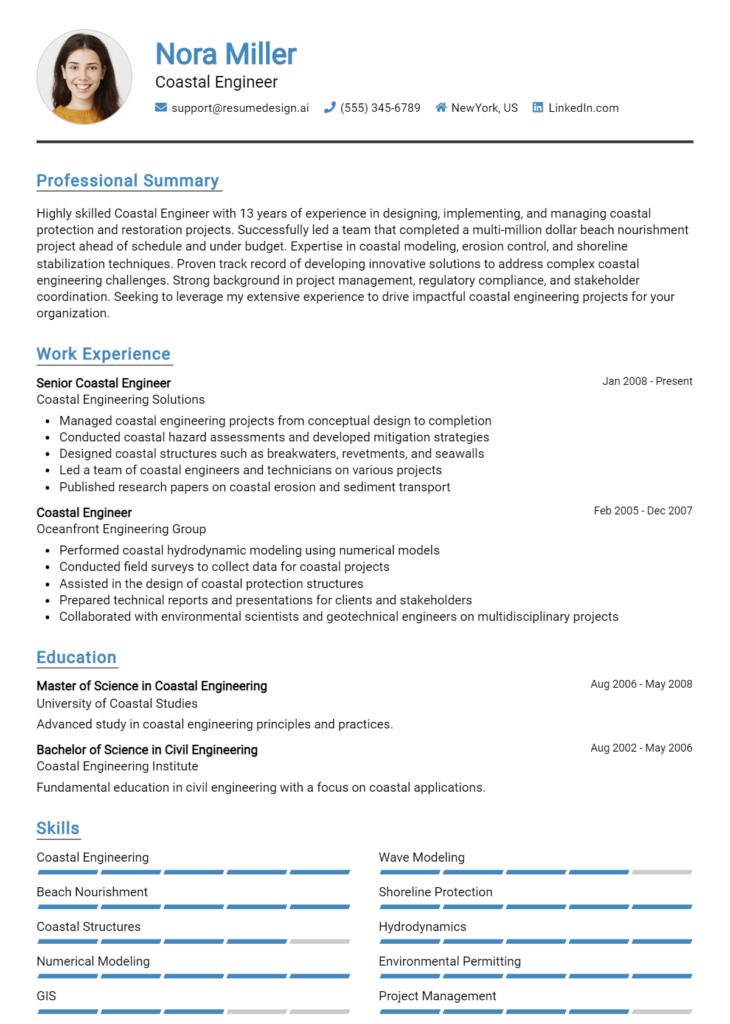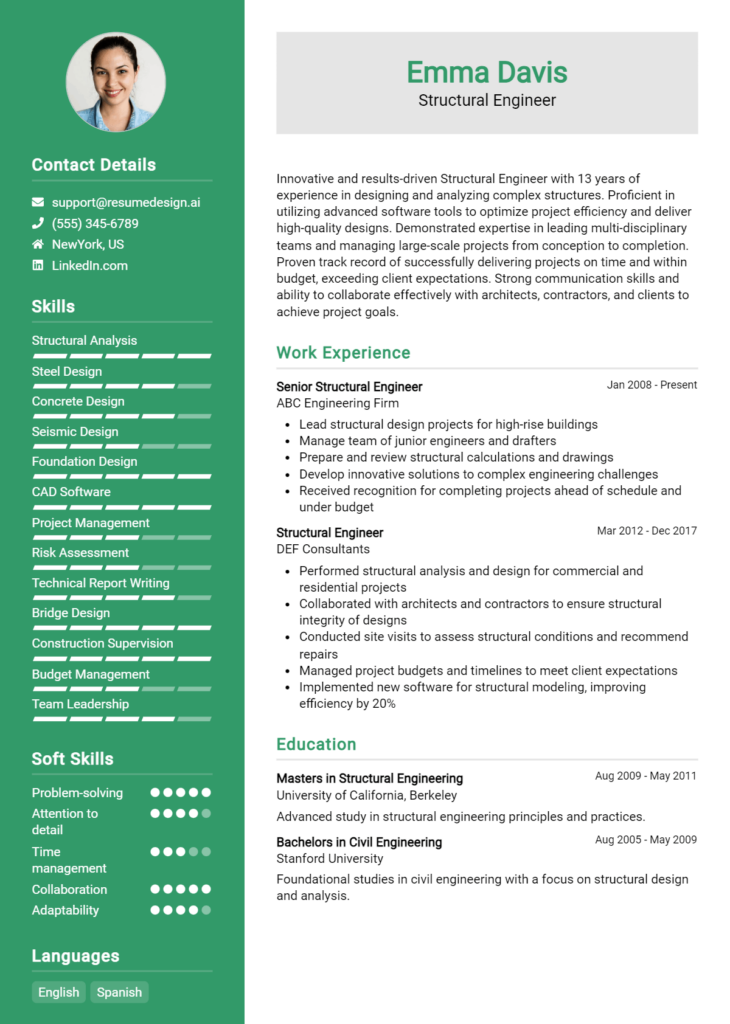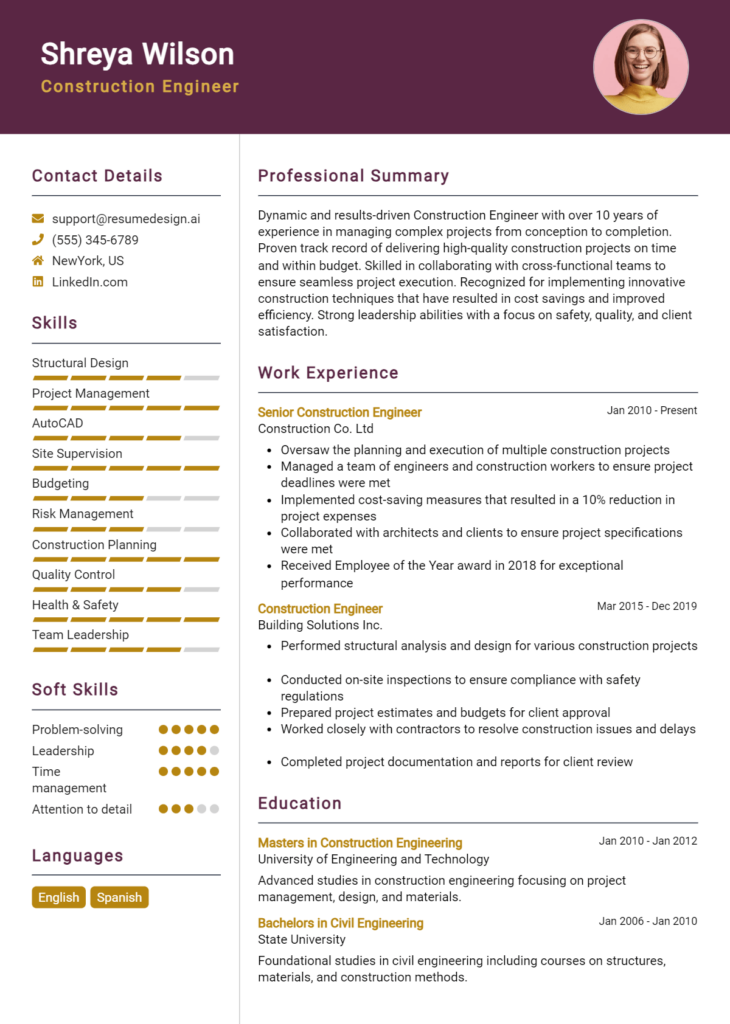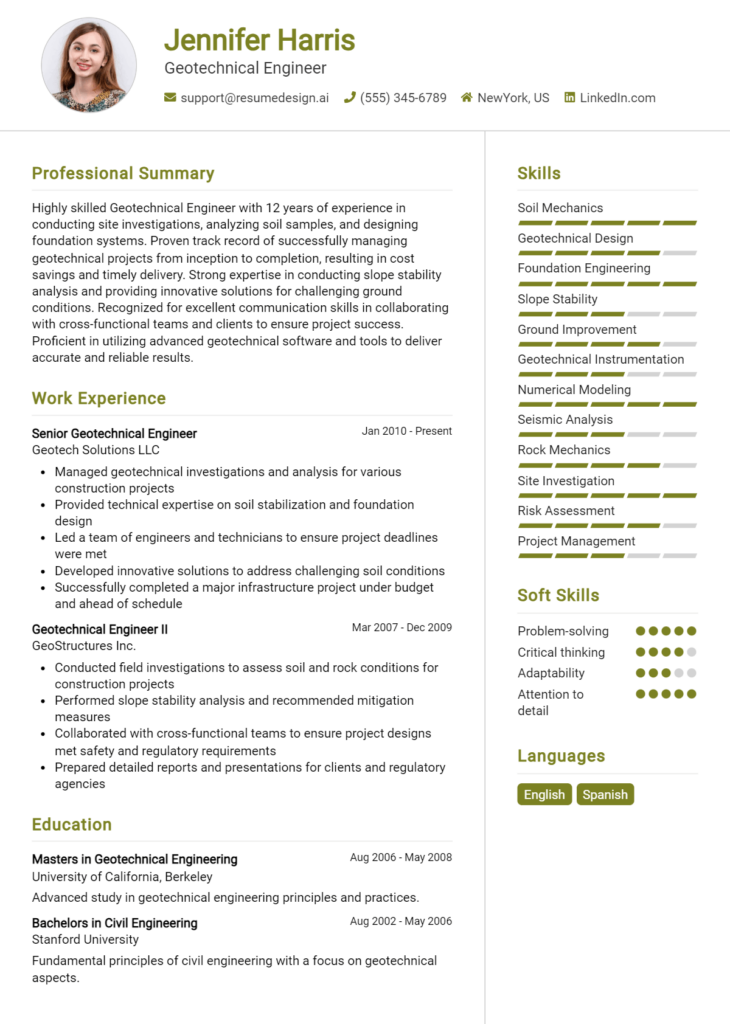Foundation Engineer Core Responsibilities
A Foundation Engineer plays a crucial role in the design, analysis, and construction of foundation systems for various structures. They collaborate with architects, geotechnical engineers, and construction teams, requiring strong technical knowledge, operational skills, and problem-solving abilities. Their expertise ensures stability and safety, contributing significantly to the organization’s goals. A well-structured resume highlighting these skills, along with project experience and certifications, can effectively showcase a candidate's qualifications and readiness for the role.
Common Responsibilities Listed on Foundation Engineer Resume
- Conduct site investigations and soil analysis to determine foundation requirements.
- Design foundation systems, including shallow and deep foundations.
- Collaborate with architects and structural engineers on project specifications.
- Oversee construction activities to ensure compliance with design specifications.
- Perform load calculations and stability assessments.
- Develop and review technical reports and documentation.
- Ensure adherence to safety regulations and quality standards.
- Provide technical support during the construction phase.
- Analyze and mitigate risks associated with foundation construction.
- Monitor and manage project timelines and budgets.
- Communicate effectively with stakeholders across various departments.
- Stay updated with industry trends, technologies, and regulations.
High-Level Resume Tips for Foundation Engineer Professionals
A well-crafted resume is crucial for Foundation Engineer professionals, as it serves as the first impression a candidate makes on potential employers. In a competitive job market, your resume must not only reflect your technical skills and achievements but also convey your unique value proposition. A strong resume can open doors to interviews and ultimately lead to job offers. This guide will provide practical and actionable resume tips specifically tailored for Foundation Engineer professionals, equipping you with the tools you need to stand out in your field.
Top Resume Tips for Foundation Engineer Professionals
- Tailor your resume for each job application by aligning your skills and experiences with the job description.
- Highlight relevant experience by focusing on specific projects related to foundation engineering, including design, analysis, and construction.
- Quantify your achievements by using metrics, such as the size of projects you’ve worked on or improvements in efficiency you have achieved.
- Showcase industry-specific skills, such as knowledge of geotechnical engineering principles, soil mechanics, and foundation design software.
- Include certifications and licenses relevant to foundation engineering, such as Professional Engineer (PE) license or certifications in geotechnical engineering.
- Utilize action verbs to describe your responsibilities and achievements, making your contributions clear and impactful.
- Incorporate keywords from the job posting to help your resume pass through Applicant Tracking Systems (ATS).
- Keep the format clean and professional, using clear headings and bullet points for easy readability.
- Include a professional summary at the top of your resume that encapsulates your experience, skills, and career goals.
By implementing these tips, you can significantly increase your chances of landing a job in the Foundation Engineer field. A well-structured and targeted resume not only highlights your qualifications but also demonstrates to employers that you understand the specific requirements and challenges of the industry, making you a more attractive candidate.
Why Resume Headlines & Titles are Important for Foundation Engineer
In the competitive field of foundation engineering, crafting a compelling resume is essential for standing out among a sea of applicants. A well-thought-out resume headline or title serves as a powerful first impression, instantly grabbing the attention of hiring managers and summarizing a candidate's key qualifications in a concise and impactful phrase. This brief yet relevant statement should reflect the candidate's expertise, skills, and experience, making it clear how they align with the specific role being applied for. By effectively utilizing a strong headline, candidates can set the tone for the rest of their resume and increase their chances of being noticed in the hiring process.
Best Practices for Crafting Resume Headlines for Foundation Engineer
- Keep it concise—aim for a single impactful phrase.
- Make it role-specific to reflect the position you’re applying for.
- Highlight key skills or achievements relevant to foundation engineering.
- Use industry-specific terminology to demonstrate expertise.
- Avoid generic phrases; be as specific as possible.
- Consider including quantifiable achievements or certifications.
- Use action-oriented language to convey confidence and competence.
- Review and revise to ensure clarity and relevance.
Example Resume Headlines for Foundation Engineer
Strong Resume Headlines
Experienced Foundation Engineer with 10+ Years in Geotechnical Design and Analysis
Certified Professional Engineer Specializing in Deep Foundation Systems
Results-Driven Foundation Engineer with Proven Success in Large-Scale Infrastructure Projects
Weak Resume Headlines
Engineer Looking for Job
Foundation Engineer
Strong resume headlines are effective because they convey specific qualifications and achievements that align directly with the needs of the employer. They are tailored to the foundation engineering field, showcasing the candidate's expertise and enhancing their appeal. In contrast, weak headlines fail to impress due to their vagueness and lack of detail, leaving hiring managers with little incentive to explore the candidate's resume further. A strong headline not only captures attention but also sets the stage for the candidate's qualifications, making it a critical component of a successful resume.
Writing an Exceptional Foundation Engineer Resume Summary
A well-crafted resume summary is essential for a Foundation Engineer as it serves as a powerful introduction that can quickly capture the attention of hiring managers. This concise paragraph highlights key skills, relevant experience, and significant accomplishments, making it an invaluable tool in the competitive engineering job market. An impactful summary can set the tone for the entire resume, ensuring that the most important attributes of the candidate are communicated effectively and tailored to match the specific job requirements. By focusing on the unique strengths and contributions that a Foundation Engineer brings to the table, candidates can make a memorable first impression that encourages further review of their qualifications.
Best Practices for Writing a Foundation Engineer Resume Summary
- Quantify achievements to showcase proven results and impact.
- Focus on relevant skills that align with the job description.
- Tailor the summary to reflect the specific requirements of the job.
- Use industry-specific terminology to demonstrate expertise.
- Highlight key certifications or specialized training in foundation engineering.
- Keep it concise, ideally within 3-5 sentences.
- Avoid generic statements; aim for specificity in accomplishments.
- Emphasize teamwork and project management experience where applicable.
Example Foundation Engineer Resume Summaries
Strong Resume Summaries
Detail-oriented Foundation Engineer with over 8 years of experience in designing and analyzing foundation systems for commercial and residential projects, resulting in a 20% reduction in project costs through innovative engineering solutions.
Licensed Professional Engineer with a track record of successfully managing multi-million dollar foundation projects, achieving on-time delivery and 15% under budget through effective team leadership and strategic resource allocation.
Experienced in geotechnical investigations and foundation design, having completed over 50 projects that improved structural integrity by up to 30%, while ensuring compliance with local building codes and regulations.
Weak Resume Summaries
Foundation Engineer with experience in various projects looking for new opportunities.
Motivated engineer seeking a position in foundation engineering to utilize skills and contribute to team projects.
The examples provided illustrate the stark contrast between strong and weak resume summaries. Strong summaries effectively quantify achievements, specify relevant skills, and demonstrate direct relevance to the Foundation Engineer role, making them impactful and persuasive. Conversely, weak summaries lack detail, specificity, and measurable outcomes, rendering them too generic to capture the interest of hiring managers.
Work Experience Section for Foundation Engineer Resume
The work experience section of a Foundation Engineer resume is a critical component that provides potential employers with insights into the candidate's technical skills, team management capabilities, and overall ability to deliver high-quality engineering solutions. This section not only highlights specific projects and responsibilities but also emphasizes the candidate's achievements in quantifiable terms. Aligning work experience with industry standards ensures that the candidate demonstrates relevant expertise, making it easier for hiring managers to assess their fit for the role. By showcasing a blend of technical proficiency and successful project outcomes, candidates can effectively position themselves as strong contenders in a competitive job market.
Best Practices for Foundation Engineer Work Experience
- Use clear and specific job titles that reflect your role accurately.
- Quantify achievements with metrics such as project costs, timelines, and performance improvements.
- Highlight relevant technical skills and software proficiencies that are industry-standard.
- Emphasize leadership roles and team management experiences in project settings.
- Detail collaborative efforts with cross-functional teams to showcase teamwork.
- Align descriptions with the job requirements of the positions you are applying for.
- Include challenges faced and how you overcame them to demonstrate problem-solving skills.
- Keep descriptions concise and focused on results to maintain engagement.
Example Work Experiences for Foundation Engineer
Strong Experiences
- Led a team of 10 engineers in the design and construction of a 500-meter deep foundation for a high-rise building, completing the project 20% under budget and 15% ahead of schedule.
- Implemented a new soil stabilization technique that improved load-bearing capacity by 30%, resulting in a 25% reduction in overall material costs.
- Coordinated with architects and contractors to deliver a foundation for a commercial complex that achieved LEED certification, enhancing project sustainability.
Weak Experiences
- Worked on various foundation projects with little direction.
- Assisted in some aspects of project management.
- Helped to improve team communication.
The examples of strong experiences are considered effective because they provide specific details about the candidate's roles, quantify their accomplishments, and demonstrate both leadership and collaborative efforts in significant projects. In contrast, the weak experiences lack specificity and measurable outcomes, making it difficult for employers to recognize the candidate's contributions and capabilities. Clear, quantifiable examples are essential for conveying expertise and impact in the field of foundation engineering.
Education and Certifications Section for Foundation Engineer Resume
The education and certifications section of a Foundation Engineer resume is crucial as it showcases the candidate's academic background, relevant industry certifications, and commitment to continuous learning. This section serves as a testament to the candidate's foundational knowledge and specialized skills, which are essential in the field of foundation engineering. By providing details on relevant coursework, certifications, and any specialized training, candidates can significantly enhance their credibility and demonstrate alignment with the job role, making a compelling case for their qualifications in a competitive job market.
Best Practices for Foundation Engineer Education and Certifications
- Prioritize relevant degrees and certifications that directly relate to foundation engineering.
- Include specific coursework that demonstrates expertise in geotechnical engineering, structural design, and soil mechanics.
- Highlight any industry-recognized certifications, such as Professional Engineer (PE) or Certified Construction Manager (CCM).
- Detail any specialized training or workshops that enhance technical skills or knowledge in foundation engineering.
- Use a clear and organized format to present educational qualifications, making it easy for employers to scan for key information.
- Keep the information current; remove outdated certifications or irrelevant coursework to maintain clarity and focus.
- Consider including GPA or honors if they are impressive and relevant to the job application.
- Tailor the education section to reflect the requirements of the specific job posting.
Example Education and Certifications for Foundation Engineer
Strong Examples
- Bachelor of Science in Civil Engineering, University of XYZ, Graduated May 2021
- Master's in Geotechnical Engineering, University of ABC, Graduated December 2022
- Professional Engineer (PE) License, State of California, Issued January 2023
- Certification in Advanced Foundation Design, International Association of Foundation Engineers, Completed June 2023
Weak Examples
- Bachelor of Arts in English Literature, University of DEF, Graduated May 2020
- Certification in Basic Computer Skills, Online Learning Platform, Completed March 2021
- Diploma in Graphic Design, Technical College of GHI, Graduated June 2019
- Outdated OSHA Safety Certification, Expired December 2020
The strong examples listed are considered robust because they directly align with the qualifications and skills required for a Foundation Engineer role, showcasing relevant degrees and current certifications that enhance the candidate's profile. In contrast, the weak examples demonstrate a lack of relevance to the foundation engineering field, featuring degrees and certifications that do not contribute to the candidate's qualifications for this specialized profession. Such discrepancies can detract from the overall effectiveness of the resume and may raise questions about the candidate's suitability for the role.
Top Skills & Keywords for Foundation Engineer Resume
In the competitive field of foundation engineering, showcasing the right skills on your resume is crucial for standing out to potential employers. A well-crafted resume not only highlights your technical expertise but also emphasizes your soft skills, which are equally important in ensuring effective collaboration and project management. By strategically including relevant skills, you can demonstrate your readiness to tackle complex engineering challenges while working effectively within a team. For more guidance on how to present your skills effectively, check out this skills resource.
Top Hard & Soft Skills for Foundation Engineer
Soft Skills
- Communication Skills
- Team Collaboration
- Problem-Solving
- Analytical Thinking
- Time Management
- Adaptability
- Attention to Detail
- Leadership
- Project Management
- Critical Thinking
- Client Relations
- Negotiation Skills
- Creativity
- Conflict Resolution
- Organizational Skills
- Decision-Making
- Interpersonal Skills
- Resilience
Hard Skills
- Geotechnical Analysis
- Soil Mechanics
- Foundation Design
- Structural Engineering Principles
- Site Investigation Techniques
- CAD Software Proficiency (AutoCAD, Revit)
- Finite Element Analysis
- Construction Methods
- Earth Retention Systems
- Load Calculations
- Risk Assessment
- Material Science Knowledge
- Regulatory Compliance
- Project Cost Estimation
- Site Management
- Environmental Impact Assessment
- Quality Control Procedures
- Surveying Techniques
Incorporating these skills into your resume can enhance your chances of landing a position as a foundation engineer. Additionally, don't forget to highlight your work experience to complement these skills and provide concrete examples of your expertise.
Stand Out with a Winning Foundation Engineer Cover Letter
I am writing to express my interest in the Foundation Engineer position at [Company Name]. With a solid background in geotechnical engineering and extensive experience in foundation design and analysis, I am confident in my ability to contribute effectively to your team. My academic foundation, complemented by hands-on experience in various projects, has equipped me with the skills necessary to tackle complex foundation challenges and deliver innovative engineering solutions.
Throughout my career, I have successfully managed multiple foundation projects, from preliminary site investigations to the final design and construction phases. My expertise in soil mechanics, along with proficiency in using advanced software tools such as PLAXIS and SAP2000, allows me to create accurate models and analyses that ensure the structural integrity of foundations. I pride myself on my attention to detail and my ability to communicate complex technical concepts to both clients and stakeholders, which has consistently resulted in successful project outcomes and satisfied customers.
At [Previous Company Name], I led a team that developed a cost-effective foundation design for a multi-story commercial building, which not only met all regulatory standards but also optimized the use of materials, resulting in significant cost savings for the client. I am passionate about sustainable engineering practices and am always looking for ways to innovate and improve foundation techniques to enhance both safety and environmental stewardship.
I am excited about the opportunity to bring my expertise to [Company Name] and contribute to your mission of delivering exceptional engineering solutions. I am looking forward to the possibility of discussing how my experience and vision align with your team’s goals. Thank you for considering my application; I hope to hear from you soon to schedule a conversation.
Common Mistakes to Avoid in a Foundation Engineer Resume
When crafting a resume for a Foundation Engineer position, it’s crucial to present your skills and experiences effectively. However, many candidates make common mistakes that can hinder their chances of getting noticed by hiring managers. Avoiding these pitfalls can significantly enhance the quality of your application and showcase your qualifications in the best light. Here are some common mistakes to watch out for:
Generic Objective Statements: Using a one-size-fits-all objective can make your resume appear unoriginal. Tailor your objective to reflect your specific interests in foundation engineering and how you can contribute to the company.
Lack of Quantifiable Achievements: Failing to include measurable achievements can weaken your resume. Always quantify your successes, such as the number of successful projects completed or the percentage of cost savings achieved.
Ignoring Relevant Keywords: Not incorporating industry-specific keywords can result in your resume being overlooked by Applicant Tracking Systems (ATS). Research job descriptions to find relevant terms and include them naturally in your resume.
Overloading with Technical Jargon: While technical skills are essential, using excessive jargon can alienate readers. Strive for a balance between demonstrating expertise and maintaining clarity for a broader audience.
Inadequate Project Descriptions: Vague descriptions of your projects can fail to convey your capabilities. Provide detailed insights into your role, the challenges faced, and the outcomes achieved in each project.
Neglecting Soft Skills: Focusing solely on technical skills while neglecting soft skills can give an incomplete picture. Highlighting skills like teamwork, communication, and problem-solving is crucial for a well-rounded resume.
Poor Formatting: A cluttered or confusing layout can detract from your resume's professionalism. Use clear headings, consistent fonts, and sufficient white space to ensure readability and a polished appearance.
Forgetting to Proofread: Spelling and grammatical errors can diminish your credibility. Always proofread your resume multiple times and consider having someone else review it to catch any mistakes you may have missed.
Conclusion
As a Foundation Engineer, your expertise is crucial in ensuring the stability and safety of structures. This role requires a deep understanding of soil mechanics, foundation design principles, and the ability to analyze various geotechnical data. Throughout this article, we discussed the importance of technical skills, problem-solving abilities, and effective communication in this field. Additionally, we emphasized the need for continuing education and professional development to stay updated with the latest industry standards and technologies.
Now that you have a clearer picture of what it takes to excel as a Foundation Engineer, it's time to ensure your resume reflects your skills and experiences effectively. A compelling resume can set you apart in a competitive job market. We encourage you to review your Foundation Engineer resume to highlight your qualifications and accomplishments clearly.
To assist you in this process, there are numerous resources available. Check out resume templates that can provide a professional layout for your document. You can also use a resume builder for a step-by-step approach to creating a polished resume. For inspiration, browse through resume examples specific to your field. Additionally, consider crafting a strong cover letter using our cover letter templates to complement your resume.
Taking these steps will enhance your application and increase your chances of landing your desired role. Don't wait—revamp your resume today!

